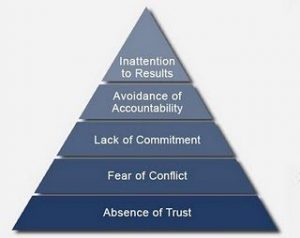Five Dysfunctions of a Team
 The Five Dysfunctions of a Team training is based on the Patrick Lencioni’s powerful best-selling book.This exciting and high-impact workshop can be presented in half-day, full-day or two-day learning sessions that are designed for intact teams or with groups of team leaders.
The Five Dysfunctions of a Team training is based on the Patrick Lencioni’s powerful best-selling book.This exciting and high-impact workshop can be presented in half-day, full-day or two-day learning sessions that are designed for intact teams or with groups of team leaders.
In the process of developing your team, make sure that you address several common misunderstandings and “five dysfunctions”: distrust, conflict, lack of commitment, lack of accountability and a failure to focus on results.
Start with the basics: Is your group a team? It doesn’t have to be. Many groups think they’re teams when they aren’t, and that misconception can frustrate people and waste time. A team must share goals and work toward them together. This requires some mutual performance evaluation. Team members must be willing to subordinate their personal needs to those of the team. True teams are “relatively small”; they might have as many as 12 people or as few as three. To build a strong and healthy team, address these five crucial issues:
Overview of the Five Dysfunctions
- Absence of trust — When they don’t trust each other, team members are afraid to communicate honestly and openly. They hide their real thoughts and feelings. They are unwilling to take responsibility for fear of making mistakes. If team members cannot communicate honestly, they cannot possibly build a platform of trust.
- Fear of conflict — When they don’t trust each other, teammates are reluctant to confront each other. Because they hide their feelings and do not communicate, they cannot engage in constructive conflict and debate. Discussion is muted, indirect and vapid. Ideas don’t get worked through. Progress stalls and the team is ineffective.
- Lack of commitment — When team members are not committed to the team and the project, they just go through the motions of attending meetings and appearing to follow up. They do not seize opportunities. Progress stalls.
- Avoidance of accountability — When team members don’t trust each other, won’t dis- cuss things honestly and aren’t committed, they don’t hold each other to a standard of accountability. Thus, efforts lack focus, energy dissipates and everything unaccountable, predictably, falls apart.
- Inattention to Results — Members of a dysfunctional team pursue personal or departmental agendas instead of the team’s goal. They may be out to score ego points or undercut a rival, but whatever their object is, it isn’t what the team needs to do.
For more information contact: training@faithworksleadership.com
